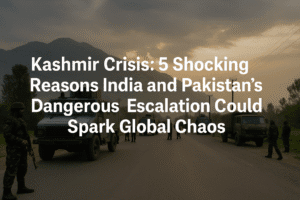Kashmir Crisis: 5 Shocking Reasons India and Pakistan’s Dangerous Escalation Could Spark Global Chaos
A deadly attack on tourists in Indian-administered Kashmir has reignited tensions between nuclear-armed rivals India and Pakistan, pushing them toward their gravest crisis in years. After militants killed 26 people near Pahalgam, India accused Pakistan of involvement—a claim Islamabad denied—and retaliated by suspending a landmark water-sharing treaty, slashing diplomatic ties, and revoking visas. Pakistan countered by halting trade, closing airspace to Indian flights, and threatening to abandon a key peace pact.
The dispute centers on Kashmir, a region both claim in full, where decades of conflict have fueled militancy and repression. India’s move to weaponize water resources, critical to Pakistan’s survival, risks ecological and humanitarian disaster, while Islamabad’s warnings of “act of war” amplify fears of escalation. With both nations armed with nuclear arsenals and a history of botched diplomacy, the crisis underscores South Asia’s fragility. Global powers face urgent calls to mediate before brinkmanship spirals into catastrophe, as millions grapple with the human and environmental toll of a feud with no end in sight.

Kashmir Crisis: 5 Shocking Reasons India and Pakistan’s Dangerous Escalation Could Spark Global Chaos
The Himalayan region of Kashmir, long a flashpoint between nuclear-armed neighbors India and Pakistan, is once again at the center of a dangerous geopolitical standoff. A lethal attack on tourists in Indian-administered Kashmir has reignited decades-old tensions, prompting both nations to adopt aggressive posturing, suspend critical agreements, and edge closer to a conflict with global ramifications. Here’s a deeper look at the crisis, its roots, and why the world should pay attention.
The Trigger: A Brazen Attack and Swift Retaliation
On April 23, 2025, gunmen targeted a group of tourists near Pahalgam, a scenic town in Kashmir, killing 26 people—most of them Indian nationals. A previously unknown group, Kashmir Resistance, claimed responsibility, but India swiftly accused Pakistan of orchestrating the assault. While Islamabad denied involvement, New Delhi retaliated with sweeping measures:
- Downgrading diplomatic relations.
- Suspending the Indus Water Treaty, a 1960s-era agreement governing shared river resources.
- Revoking visas for Pakistani nationals and reducing embassy staff.
Pakistan responded in kind, halting trade, closing airspace to Indian flights, and threatening to suspend the Simla Agreement, a 1972 pact designed to resolve disputes bilaterally.
Why Kashmir? The Heart of a 75-Year Feud
Kashmir’s contested status has fueled three wars (1947, 1965, and 1999) and countless skirmishes. Both nations claim the region in full but control parts of it, separated by the Line of Control (LoC). For India, Kashmir symbolizes territorial integrity; for Pakistan, it represents unfinished business from partition. Meanwhile, many Kashmiris, weary of militarization and political repression, continue to demand self-determination—a struggle often met with harsh crackdowns.
The latest violence underscores how militant groups (whether homegrown or externally backed) exploit this volatility, derailing fragile peace efforts.
Water Wars: A Ticking Time Bomb
India’s suspension of the Indus Water Treaty marks a critical escalation. The treaty, mediated by the World Bank, allocates control of six rivers between the nations. Pakistan relies on these waters for 80% of its agriculture, making the treaty a lifeline for its economy and food security. New Delhi’s move to restrict water flow could devastate Pakistani farms, exacerbate drought, and inflame public unrest—a scenario Islamabad calls an “act of war.”
Experts warn that weaponizing water risks destabilizing South Asia, where climate change already strains resources.
A History of Fractured Diplomacy
Past efforts to ease tensions have repeatedly collapsed:
- 2008 Mumbai Attacks: Pakistan-based militants killed 166 people, derailing talks.
- 2019 Pulwama Bombing: A suicide attack in Kashmir led to aerial dogfights and captured pilots.
- 2019 Kashmir Status Revocation: India stripped Kashmir’s autonomy, deepening distrust.
Each crisis reinforces a cycle of retaliation, with diplomacy often sidelined by domestic politics. Indian Prime Minister Narendra Modi’s nationalist stance and Pakistan’s reliance on military-backed governance leave little room for compromise.
Nuclear Shadows and Global Stakes
Both nations possess over 150 nuclear warheads and advanced missile systems. While full-scale war seems unlikely, miscalculations—like skirmishes along the LoC or cyberattacks—could spiral. The closure of airspace, revoked visas, and halted trade also disrupt regional economies and diaspora communities, illustrating how localized conflicts have global ripple effects.
Paths Forward: Diplomacy or Disaster?
- Third-Party Mediation: The U.S., China, or the UN could revive dialogue, though both nations historically resist external interference.
- Humanitarian Focus: Addressing Kashmir’s human rights crisis and economic despair could reduce militancy’s appeal.
- Climate Cooperation: Joint management of water and climate resources might build trust.
Conclusion: A Test for South Asia’s Future
The Kashmir conflict is more than a territorial dispute—it’s a litmus test for whether nuclear rivals can prioritize stability over brinkmanship. With millions of lives and ecological security at stake, the international community must urge restraint. History shows that in South Asia, peace is fragile, but war is catastrophic.
As both nations dig in, the world watches nervously, hoping cooler heads prevail before the unthinkable becomes inevitable.
You must be logged in to post a comment.